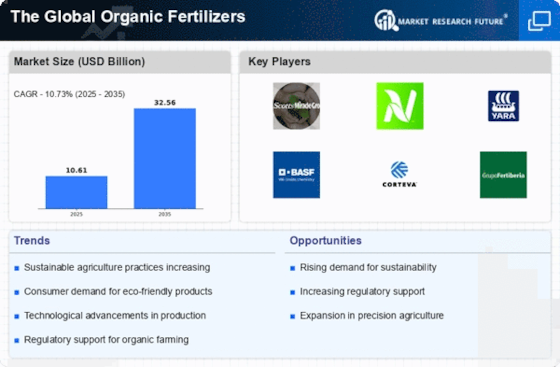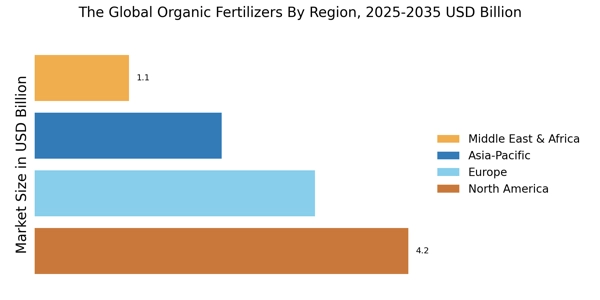Increasing Consumer Awareness
The rising awareness among consumers regarding the benefits of organic products is a pivotal driver for The Global Organic Fertilizers Industry. As health-conscious individuals seek to avoid synthetic chemicals in their food, the demand for organic produce has surged. This trend is reflected in market data, indicating that organic food sales have consistently outpaced conventional food sales in various regions. Consequently, farmers are increasingly adopting organic fertilizers to meet consumer preferences, thereby propelling the growth of the organic fertilizers sector. The shift towards sustainable agricultural practices is not merely a trend but appears to be a fundamental change in consumer behavior, which is likely to sustain the demand for organic fertilizers in the foreseeable future.
Government Initiatives and Support
Government initiatives aimed at promoting organic farming are playing a crucial role in The Global Organic Fertilizers Industry. Various countries have implemented policies that encourage the use of organic fertilizers through subsidies, grants, and educational programs. For instance, some governments have set ambitious targets for increasing the percentage of organic farming within their agricultural sectors. This regulatory support is likely to enhance the adoption of organic fertilizers among farmers, as they seek to comply with new standards and benefit from financial incentives. The positive impact of such initiatives is evident in the growing market share of organic fertilizers, which is projected to continue expanding as governments prioritize sustainable agricultural practices.
Sustainable Agricultural Practices
The adoption of sustainable agricultural practices is a significant driver for The Global Organic Fertilizers Industry. Farmers are increasingly recognizing the importance of maintaining soil health and biodiversity, which organic fertilizers can enhance. According to recent data, the area under organic farming has expanded, with millions of hectares now dedicated to organic agriculture. This shift is driven by the need to combat soil degradation and promote environmental sustainability. As more farmers transition to organic methods, the demand for organic fertilizers is expected to rise correspondingly. This trend not only supports ecological balance but also aligns with global efforts to achieve food security and sustainable development goals.
Rising Global Population and Food Demand
The increasing The Global Organic Fertilizers Industry. As the world population approaches 9 billion by 2050, the pressure on agricultural systems to produce more food sustainably intensifies. Organic fertilizers offer a viable solution to enhance soil fertility and crop productivity without compromising environmental health. Market projections indicate that the demand for organic fertilizers will grow as farmers seek to meet the nutritional needs of a burgeoning population. This trend underscores the importance of integrating organic practices into mainstream agriculture, thereby ensuring food security while promoting sustainable farming methods.
Technological Innovations in Fertilizer Production
Technological innovations in fertilizer production are significantly influencing The Global Organic Fertilizers Industry. Advances in processing techniques and the development of new organic fertilizer formulations have improved the efficiency and effectiveness of these products. For example, the introduction of bio-based fertilizers has shown promising results in enhancing crop yields while maintaining environmental integrity. Market data suggests that the segment of bio-based fertilizers is experiencing rapid growth, driven by both consumer demand and regulatory pressures. As technology continues to evolve, it is likely that the organic fertilizers market will see further innovations, making these products more accessible and appealing to farmers worldwide.

















